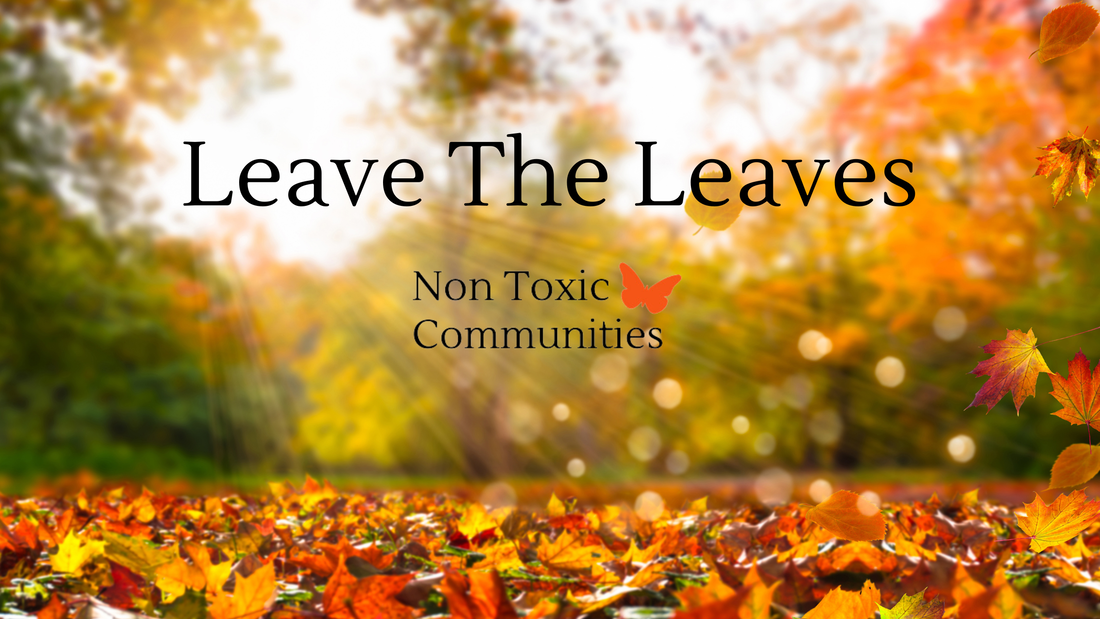|
It's fall, and the task of readying our properties for winter is at hand. We've all seen the #LeaveTheLeaves posts, but there are few things everyone should know about how to do it best. Q: Should I “leave the leaves” in my gardens?
A: Yes! Leaves provide valuable food and shelter for bees, moths, butterflies and other wildlife. It’s best to leave them there year-round to naturally decompose and return nutrients to the soil. Q: Should I just leave all the leaves everywhere they land and skip clean-up? A: Leaving the leaves in our gardens will benefit wildlife, but that doesn’t mean you shouldn’t clean up any leaves at all! Man-made hardscapes like walkways, patios, driveways, sidewalks and streets still need to be swept clean for safety reasons, and to keep our aquatic ecosystems healthy. Leaves have beneficial nutrients like nitrogen and phosphorus that they release when they break down. This is good for plants and soil when we leave them in gardens, or in thin layers on a lawn. But if these same nutrients are allowed to wash into our stormwater systems, just like the nitrogen and phosphorus that leach from synthetic fertilizer applications, they can have a detrimental effect. Leaves are natural, but our watersheds are not able to process the excess nutrients from all neighborhoods in our municipal stormwater systems. Removal of leaf litter from streets and hardscapes in the fall can reduce phosphorus loads by over 80% to protect water quality. We all must do our part to rake and sweep the leaves from these areas while we “leave the leaves” in the places where they belong. This way, we support pollinators and protect biodiversity on land and in our watersheds. Q: Should I cut back the stems on my plants in the fall? A: Since pollinators use stems as nesting material and birds eat the seeds of native plants throughout the winter, ideally we should try to leave stems standing in our perennial gardens and not remove them wherever possible. Q: I left the leaves all winter, should I clean up in spring? A: Best practice is to leave the leaves permanently in garden beds. If leaves are too thick and plants may be smothered or for some other reason need to be cleaned up, wait as long as you can to remove leaves. Try to keep those leaves on the property by adding them to natural areas in the yard, or to wire bins where any remaining creatures are able to emerge from the leaf litter when they are ready. Stems can be left standing as well, or only cut part way if you must make compromises with HOAs. New growth will come up around them as they decompose. Try to leave as much natural plant material in garden beds as you can, while maintaining edges and giving “cues to care.” Q: What about ticks, won’t I have a problem if I don’t remove all the leaves? A: Ticks are definitely a concern since they can transmit multiple infections (See Help! I’ve Gotten A Tick Bite, Now What?) and we need to take personal protective measures when outdoors to prevent bites like wearing repellant, tucking pants into socks, doing regular tick checks, etc. Penn State says, “Ticks prefer cool, wet, shady places and are mostly found in densely wooded areas. They like stonewalls, and woodpiles but are also found in grassy or brushy areas. The unmaintained edge between woodland or brush and your lawn, called the ecotone, is the next highest in tick population. Ornamental vegetation (like native perennials) and the lawn have the least number of ticks. Ticks don’t like open, sunny areas. Knowing the ticks’ favorite habitats can help you make your property more tick-resistant.” As far as our yards are concerned, habitat modification and creating a healthy balanced ecosystem is our best bet to keeping them in check. Separating ‘wild’ areas of the yard from gardens and lawn areas by a mulch border is recommended (See Create a Tick Free Yard). Spraying with insecticides does not reduce tick encounters, and whether synthetic or natural, broad spectrum insecticides will kill pollinators and other beneficial insects. Excerpted from the Pollinator Friendly Yards FAQ. Check out the PFY group on Facebook to learn more about supporting biodiversity and organic landscaping practices. Comments are closed.
|
Archives
March 2024
Categories |
|
Non Toxic Communities is a 501 (c) (3) charitable organization
Nontoxic Communities Foundation, Inc. dba Non Toxic Communities Copyright © 2024 Non Toxic Communities - All Rights Reserved Site design by Bee Rooted | About Us | Contact Us |

 RSS Feed
RSS Feed
